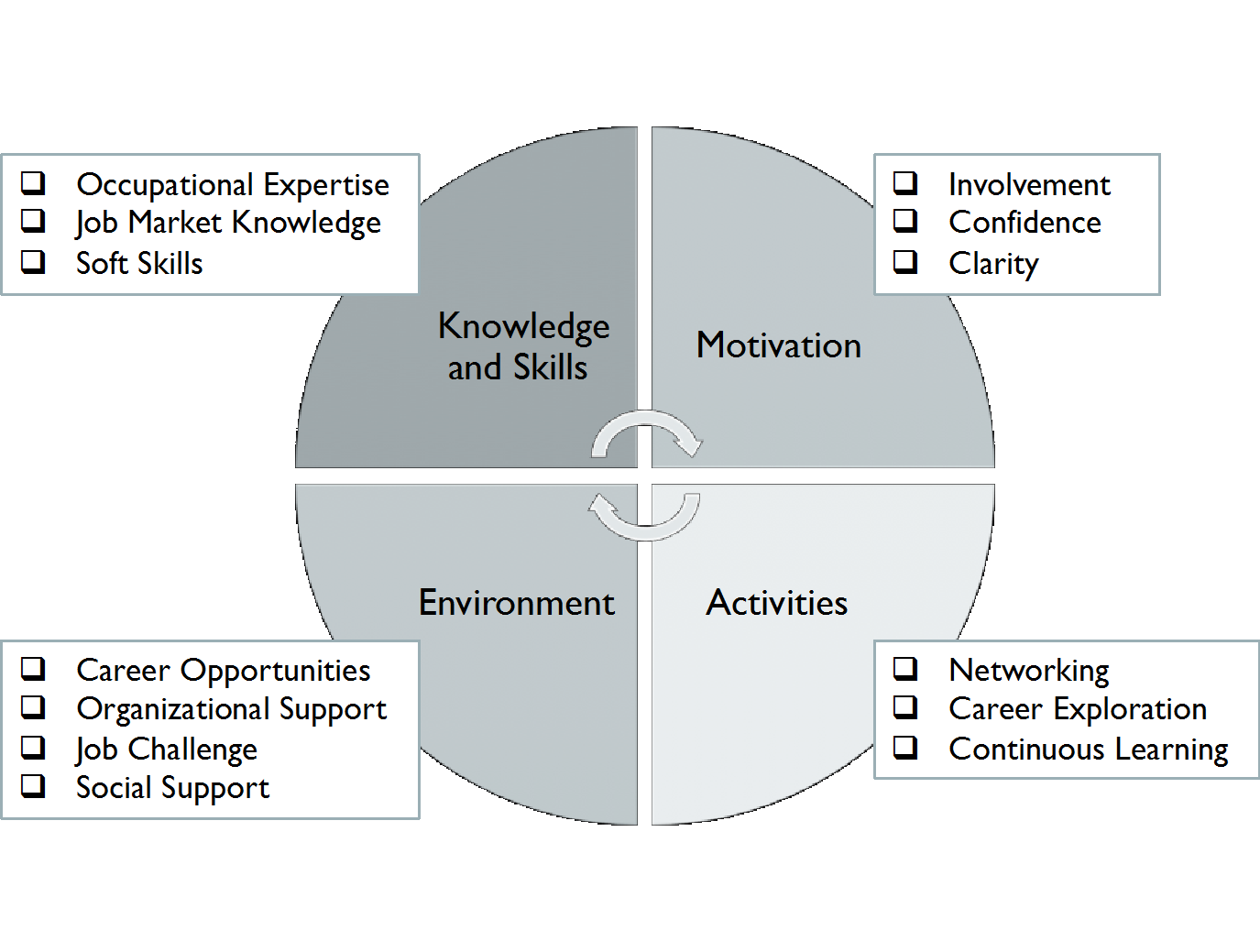
What determines career success? This question has occupied careers research, professional and career counselling, as well as individuals for decades. There is consensus amongst careers researchers that to develop oneself professionally, there is more needed than simply finding a job that matches one’s strengths and interests. The current world of work is increasingly characterised by individual, self-directed careers over an ever-longer period of the lifespan.
Due to the increasingly dynamic nature of the job market, it is of growing importance to actively develop one’s career. For this, one needs resources that help reach personal goals. In line with this, the focus in career counselling has switched from the identification of relatively stable personal traits and their fitting environments to a more dynamic support of clients in mastering individual professional challenges through the development of their employability, adaptability, and career resources.
Whereas there are numerous diagnostic tests available that assess personality traits, interests, or skills there is a lack of comprehensive test instruments to identify malleable and trainable factors that make people successful in today’s work environments. Both the scientific and popular literatures suggest numerous factors that are important for a successful career. Also, there is a wealth of theoretical models, measures, and empirical studies aiming to identify single predictors of career success: As many as 64 potential facilitators of career success were identified by previous research, offering a vast array of sometimes unique, other times largely redundant concepts and variables as correlates and predictors of career success. These developments result in a need for a more concise and integrative view to understand and measure key predictors of career success.
| Sign up for our newsletter here. |
We have thus undertaken a study to identify and outline a comprehensive model of central factors that are scientifically supported to be important for career success as well as to create a diagnostic tool to assess these factors. To achieve this, the researchers have reviewed existing meta-analyses, theoretical models, and empirical research on career success and identified 13 factors that represent different resource areas (see figure).
Three resources fall into the area of “knowledge and competencies”, three resources into the area of “motivation” and four resources into the area of “environment”. Additionally, three specific behaviours in an area called “activities” were included due to the increasing importance of proactive behaviour in modern career development. The created measure had the goal of focusing on malleable factors in contrast to measuring relatively stable personality traits. Furthermore, the aim was to focus on career-relevant aspects, for example on career-related self-efficacy in contrast to general self-efficacy. Also, the area of environmental resources was conceptualised in a broader sense, acknowledging that not only social support, but also the current work context can provide important resources for career development.
Through a complex development process the research team generated 200 items matching these 13 factors, evaluated them through a multi-step process, and tested a final selection of questions on over 3.000 people in four surveys. This resulted in a short, reliable, and valid questionnaire that assesses central career resources of employees as well as students: the career resources questionnaire (CRQ).
Figure 1. The 13 dimensions of the career resources questionnaire (CRQ) and their corresponding four overarching areas

Research with the CRQ on different samples of professionals shows that all assessed factors are linked to salary and promotions. Furthermore, people with more resources in the assessed areas report higher levels of job- and career satisfaction. Another aspect that has been established was the relative importance of the single career resources to the outcomes of career- and job satisfaction, promotions, and salary. The results showed that for career- and job satisfaction as well as promotions, the areas “environmental resources” and “motivation” play a central role. For salary, in contrast, the areas of “motivation” and “competencies” had the highest impact.
Besides the usage in academic research, the CRQ can also be employed in career coaching and counselling, as well as for individual self-assessment. The CRQ is suitable to evaluate needs and areas for further development in career development. Depending on the magnitude of available resources, different forms of interventions can be suggested (e.g., self-help, workshops, or one-on-one counselling). With high resources, self-organised, low-level support might be enough, for example obtaining access to information or guided self-exploration. In contrast, with low resources more intense support might be needed, such as one-on-one counselling and training. The questionnaire can also be used to plan concrete contents of interventions as well as for quality development and control of career interventions.
The career resources questionnaire comprises 41 questions and is available in English and German. The complimentary basic report displays a simple profile of available resources, the comprehensive report includes a more detailed analysis with comparisons to other workers or students. There is also a wide variety of complementary material such as a workbook that helps reflect on the results of the questionnaire and its personal implications. For career development professionals, there is an interview manual to further discuss and clarify career resources with clients.
Authors’ Note: Website with more information and access to the free questionnaire: www.cresogo.com
♣♣♣
Notes:
- This blog post is based on the authors’ paper Assessing Key Predictors of Career Success: Development and Validation of the Career Resources Questionnaire, Journal of Career Assessment, 2017.
- The post gives the views of its author(s), not the position of LSE Business Review or the London School of Economics.
- Featured image credit: Photo by mohamed_hassan, under a CC0 licence.
- When you leave a comment, you’re agreeing to our Comment Policy.
 Andreas Hirschi is a full professor and chair of the department of work and organisational psychology at the University of Bern, Switzerland. He is one of Europe’s leading researchers on career choice, career development, and career counselling. In teaching, he is among others engaged in the education and training of career counsellors. Prof. Hirschi is an associate editor of the Journal of Vocational Behavior. He is an honorary member of several national and international groups and committees on vocational and career guidance, serves on the editorial boards of several scientific career journals and regularly acts as a reviewer for international journals and conferences.
Andreas Hirschi is a full professor and chair of the department of work and organisational psychology at the University of Bern, Switzerland. He is one of Europe’s leading researchers on career choice, career development, and career counselling. In teaching, he is among others engaged in the education and training of career counsellors. Prof. Hirschi is an associate editor of the Journal of Vocational Behavior. He is an honorary member of several national and international groups and committees on vocational and career guidance, serves on the editorial boards of several scientific career journals and regularly acts as a reviewer for international journals and conferences.
 Noemi Nagy is a doctoral researcher at the University of Bern’s Institute of Psychology. Her research focuses on leadership, human resource management and development, change management, organisational development, motivational psychology and work psychology.
Noemi Nagy is a doctoral researcher at the University of Bern’s Institute of Psychology. Her research focuses on leadership, human resource management and development, change management, organisational development, motivational psychology and work psychology.
 Franziska Baumeler is a doctoral candidate in work and organisational psychology at the University of Bern, Switzerland. Her research interests include career development over the lifespan with a focus on younger workers, work-nonwork interaction, self-directed career management and proactivity, and well-being.
Franziska Baumeler is a doctoral candidate in work and organisational psychology at the University of Bern, Switzerland. Her research interests include career development over the lifespan with a focus on younger workers, work-nonwork interaction, self-directed career management and proactivity, and well-being.
 Claire Johnston has a PhD in Psychology from the University of Lausanne. Her thesis, “The contribution of individual and professional characteristics to general and work-related well-being” was completed within the project “Professional trajectories: Impact of individual characteristics and resources, and cultural background” hosted by the Swiss National Centre of Competence in Research, LIVES. Her research interests include personality, justice beliefs, career adaptabilities and well-being.
Claire Johnston has a PhD in Psychology from the University of Lausanne. Her thesis, “The contribution of individual and professional characteristics to general and work-related well-being” was completed within the project “Professional trajectories: Impact of individual characteristics and resources, and cultural background” hosted by the Swiss National Centre of Competence in Research, LIVES. Her research interests include personality, justice beliefs, career adaptabilities and well-being.
 Daniel Spurk is a post-doctoral researcher and lecturer at the University of Bern’s Institute of Psychology. His research focuses on individual and organisational career management, opportunities and risks within career development, individual differences at work (e.g., personality, insecurity, and heavy work investments); and leader-member exchange.
Daniel Spurk is a post-doctoral researcher and lecturer at the University of Bern’s Institute of Psychology. His research focuses on individual and organisational career management, opportunities and risks within career development, individual differences at work (e.g., personality, insecurity, and heavy work investments); and leader-member exchange.





